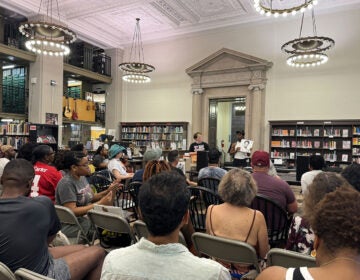Finding Elijah – A mother’s journey

Yolonda Johnson-Young earned a scholarship from the Scribe Video Center, the same place that her late son also took classes. (Photo courtesy of Kriston Bethel)
One brisk November afternoon in Penn Treaty Park, I had the opportunity of a lifetime. I assisted my then 19-year-old son, Elijah, with a film assignment for the Art Institute of Philadelphia. He had known from the age of 9 that he wanted to make films. We enjoyed discussing the plots, cinematography, and characters; often, we watched a movie more than once. The first viewing was for pure enjoyment, the next for critique and conversation.
That first day of November 2015 in the park, I watched Elijah meticulously set his equipment up, check angles and program the camera. Impressed by his laser focus; I began to photograph him. It was an exceptionally beautiful day. I was happy to be included in his world. He panned, zoomed, and tilted using freshly acquired skills from the previous year at the Art Institute. He received the Art Institute of Philadelphia Best of Quarters – 4.0 Honors at a ceremony earlier that year. I beamed with joy. My very picky child had found a passion.
I was unaware that my loving, bright, caring, talented, handsome man-child was suicidal. Elijah had spoken to me when he was about 17 with concerns about his mental health. He politely refused the help I encouraged him to seek. I would later find some of Elijah’s writings where he addressed not altering his natural state of mind with drugs (prescribed or not) or alcohol. Since Elijah’s passing, I wondered if the lack of information about proper mental health; over-reliance on spirituality and Christian faith; the reluctance and inability to access services or inequality of care were barriers to him seeking help.
Soon after our time at Penn Treaty Park, Elijah stopped speaking for nearly five months. He was selective mute at 19. I now know it is a type of anxiety disorder. Elijah still communicated via text, post-it notes and other nonverbal techniques, and he always answered his cell phone.
Finally, late in March of 2016, he began to speak again. I captured him on video that same day, singing, “Ti-i-i-ime is on my side. Yes, it is.” Our home was filled to the brim with his singing. He seemed like a new Elijah.
But in May, Elijah would leave never to return. He very briefly checked into a mental health crisis unit, then disappeared. Elijah left blank the section in the paperwork pertaining to whom to release information. He was 19 and had rights. The HIPAA privacy rule should reconsider allowing patients entering a mental health crisis facility the option to deny family access to information. Elijah rendered me helpless. HIPAA protected his information, but not him or our family.
I filed a missing person report in June, and a detective assured me that police were actively searching for him. What I did not know until later is that Elijah had a brief stay at Covenant House PA and used Broad Street Ministry for an address to receive his mail.
In January 2017, a Philadelphia police detective alerted me that Elijah was alive and well in New York City. I was elated. The detective informed Elijah that his family was concerned about his well-being, but Elijah said that he was fine where he was, and that he had a job and a place to stay.
Elijah was not fine. He was found in a New York City hotel room, deceased by suicide that June. I traveled to NYC to retrieve Elijah’s belongings. My heart shattered as I left Manhattan without him. On the ride out of the city, I felt as if my soul was trying to escape my body to stay with him. My breath struggled to enter and exit. I thought I would die.
Later, I tried to make sense of how Elijah was able to mix lethal chemicals without detection. How could he have disconnected the carbon monoxide sensor?
During his three-day stay, Elijah never left the hotel room; he managed to disconnect the sensor, mix noxious chemicals and remain undetected by the staff. I searched online to find any information about carbon monoxide regulations for the hotel industry but saw nothing to quell my fear of this happening to another family.
I believe that hotels should have more security measures in place to thwart tragedies on their premises. Yes, you deserve privacy at hotels, but not at the expense of safety. When shootings, suicides, rape and murders are committed at a school or hospital, there is national outrage.
The Sept. 1, 1910 New York Post story, The Hotel Suicide, stated, “Many unfortunates whom desperation has brought to the point of slaughter have no homes and consequently no beds of their own…the seclusion of a cheap lodging is the best they can find.” This has been an ongoing problem. Where is the outrage?
At the beginning of my grief, my only wish was to honor Elijah’s memory and share his art with the world. I quickly realized the scope of the task. To do this, I decided to become a filmmaker. I truly wanted to help another family avoid our tragedy. On the advice of a close family friend, I applied to Scribe Video Center for a documentary filmmaking scholarship and a Leeway Foundation grant.
In 2009, Elijah had been a student in Scribe’s Documentary History Project for Youth. I received the scholarship at Scribe. It was a full-circle moment. On the third attempt, I received the Leeway grant, too.
One day, while driving in Germantown, I found myself lost on Armat Street. I immediately remembered a video I had seen on one of Elijah’s devices retrieved from NYC. It was of an older man hobbling along what looked to be Germantown Avenue. The video zooms in on the street sign, Armat Street. I immediately pulled over.
“Elijah, were you here?” I said aloud. It was almost at that exact moment I gazed upon a bright blue awning. Driving closer, I could read the white letters. Covenant House. I immediately pulled over to call the number I googled. Mr. Elliot answered the phone. After I asked a few nervous questions and explained the reasons why, Mr. Elliot said that he knew Elijah and was his case manager at one point. He agreed to speak with me. I learned the exact date Elijah and another young man from Covenant House traveled to New York City. Answers were coming to me.
I started the workshops at Scribe in September 2017, a few months after Elijah died. In spite of my grief, I had a goal. I had to figure out how to process my pain, become a director, and produce a piece of art worthy of viewing. I decided to look at the information I was uncovering about Elijah’s journey as a director, not a mother.
I searched my mind’s inventory to pull the facts I had learned since Elijah’s suicide. My goal was to track his steps. A grieving mother who was yearning to walk the sidewalk he strolled; to touch the doorknobs and elevator buttons he had touched, and to hug and thank those who had helped him along his way.
I needed to express my feelings and find a way to flip the pain, to turn it into a positive. In honor of Elijah, a film seemed the obvious choice.
In the year it took to create my short documentary film, I am beginning to heal and make sense out of something unfathomable. My grief motivated me to action. That action was art. Many artists use personal experiences to create works. And many people who are bereaved create works to heal.
I am no different. I think back to that first day in November 2015 and I realize how Elijah truly inspires me. He continues to do so. Losing Elijah opened me to explore the possibilities of what I could accomplish. I needed an outlet for my creative and healing process. My initial goal to share Elijah with the world has become so much more.
While nothing will ever replace the tremendous void left by his loss, I thank Elijah for the person I am today — an artist.
WHYY is your source for fact-based, in-depth journalism and information. As a nonprofit organization, we rely on financial support from readers like you. Please give today.




